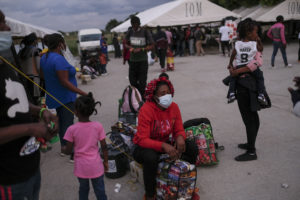In February 2016, WOLA’s Executive Director, Joy Olson, and Senior Associate, Gimena Sanchez-Garzoli, visited Port Aux Prince, Haiti to better understand the political impasse taking place and to meet Haitian civil society leaders who are working to address the countries’ long-standing governance problems.
One voice that stood out was that of Jean-Claude Fignole, who leads Oxfam Haiti’s advocacy efforts. [1] Mr. Fignole, along with other Oxfam staff accompanied us in Washington the week of July 12th. In this article, we want to share with you some of what we learning about the current situation and how decentralization may be key for more effective democracy and development.
Haiti seems in constant political disarray. Case in point is the current Haitian national leadership. Former President Michel Martelly ended his term on Feb.7, 2016 without an elected successor. While elections had been held, they were nullified due to violence and accusations of fraud. Lawmakers chose Senate chief Jocelerme Privert to lead a provisional government tasked with the organization of new elections. However, Privert’s 120-day mandate expired without new elections taking place. He refused to vacate the office, and elections are now scheduled for October 9, 2016. While democracy is based on elected government, Haiti is struggling to get beyond this point.
Mr. Fignole explained that in order to address the current political crisis, and to understand the importance of decentralization, it is necessary to understand how history has shaped the political and societal divides the country is struggling to overcome.
Power has historically been centralized in coastal areas. At the time of the colony and thereafter, this is where the plantations and production of export crops were located. The most marginalized people were those living in the interior. The interior was populated by “maroons” – escaped slaves.
For 200 years, the country had what was in essence a two class system. One set of rules for the descendants of the maroons who live mainly in the mountainous countryside (and more recently make-up the bulk of the “urban poor”), and another for the descendants of those who live in urban centers linked to the export economy.
For example, there were different birth certificates, with the urban Haitians designated as “citizens” and the rural dwellers categorized as “peasants.” Urban Haitians received education from the Ministry of Education while rural Haitians were educated by the Ministry of Agriculture. While Kreyol is the native language of Haiti, most urban Haitians operate business in French (Kreyol was not recognized as an official language until 1987). The traditional African based religion of Voodoun, while practiced throughout the country, is publicly looked down upon by urban elites as backwards.
During the U.S. occupation of 1915 to 1934 this dual-system was reinforced by efforts to strengthen the central government at the expense of local authority. Change came with the 1987 Constitution. It was supported by 99.81% of Haitians, and set out to level the playing field, establish democracy and decentralize power and resources. It established provisions that prohibit consecutive presidential terms. Local assemblies and councils directly elect their representatives and the regional departmental councils directly elect the national representatives to a national “Inter-Departmental Council” which has equivalent decision-making authority over the national budget as the Council of Ministers. Therefore, the Constitution provides an institutional framework that redistributes government resources and by extension influence, to those who historically have been the most marginalized and excluded from power centers.
While the Constitution was approved, its mandate was never implemented. What remains is a continuing divide between the few that exert national level power and the majority whose participation remains at the local level. The system in place is fraught with permanent instability because it is not seen as representative or credible by all Haitians.
International cooperation and the U.S.’s role in particular have reinforced historic power dynamics. Haiti needs functioning institutions, but international actors have defined “institution building” as the permanency of a centralized government, rather than developing institutions of a more decentralized and balanced model. Many donors have done so because they see the central government as the only credible partner with whom to cooperate.
Donors’ focus on national level elections, Mr. Fignole believes, distorts what was envisioned by the 1987 Constitution which provided for a decentralization of power and decision making, opening a path for lasting change.
Turning this around will be a long term effort but until the centralization problem is tackled, Fignole believes that substantive change will not take place in Haiti. Therefore, Oxfam is working to make the decentralization precept of the 1987 Constitution a reality by building capacity and strengthening institutions from the local and regional level up to the national one. Democratic change from the bottom up.
This alternative approach involves working through the framework for decentralized planning and cooperation laid out by the 1987 Constitution (i.e. the Communal Development Plan), while advocating for the changes at the macro-level for the transfer of decision-making power and resources to local communities. It also means building the capacity of local communal development funds.
Long-term, decentralization of political and economic power has the potential to address not only present day political impasse but begin to address historic inequities.
[1] Jean-Claude Fignole has 14 years’ experience accompanying civil society processes, directing Action Aid and working with la Fondation Sauvons un Paysand GRADIH (Research and Action Group for the Sustainable Development of Haiti). One of Mr. Fignole’s initiatives at Oxfam is to work to help regional and local Haitian actors to strengthen governance through active citizen involvement in implementing the decentralization framework of the 1987 Constitution.




